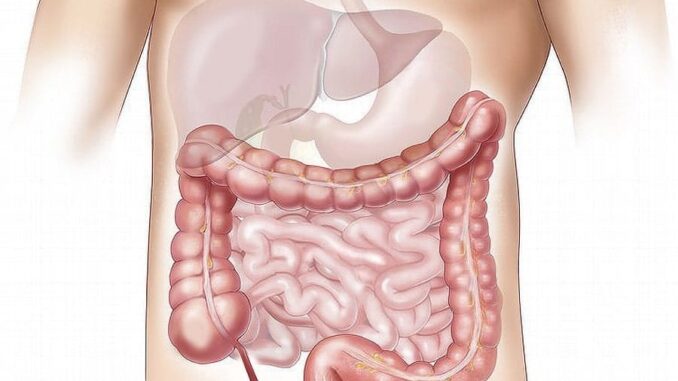
It is often said that cannabidiol CBD, has no known major side effects. It’s true. Nevertheless, initial studies indicate that it does not always have a positive effect on the liver, an important organ with many vital functions. So what are they real effects of CBD on the liver ? Is it dangerous to consume ? how Go easy on your liver while enjoying the many benefits of CBD ? All the answers in this guide.
Does CBD work on the liver?

The liver (above left) plays a role in over 300 vital functions!
Le CBD, like other cannabinoids, mainly acts on the human body through its ability to activate or block CB1 and CB2 receptors de notre endocannabinoid system (DRY). For example, the ECS is not located at a specific location in the body like an organ. On the contrary, it is defined, disseminated, by all its recipients throughout the body. So it’s found in the cells of the skin, the genitals, or even…the liver. So here we are in possession of a first response element that allows us to affirm that yes, CBD has effects on the liver.
The second particularly interesting element, demonstrated by a 2006 study, is that Number of CB1 and CB2 sensors in a healthy liver is less compared to a diseased liver. Therefore, in the presence of liver disease (affecting the liver), the CB1 and CB2 receptors are over-represented. That is, a liver suffering from cirrhosis or hepatitis, for example, has many more receptors than a healthy liver. CBD could therefore not only work well on the liver, but it might even act more on a diseased liver.
It remains to be seen if these effects are beneficial or if, on the contrary, cannabidiol can be dangerous for the liver. First observation: Overconsumption of CBD could have good adverse effects on the liver. Contraindications therefore exist, even if they still have to be qualified.
CBD and liver: what contraindications?
At very high doses, some studies have shown that CBD poses serious risks to the liver:
- increasing the liver volume,
- Elevated plasma levels of ALT and AST enzymes (signs of destruction of liver cells),
- Elevated bilirubin levels (a sign of a hepatic dysfunction no longer properly performing its job of breaking down hemoglobin/red blood cells).
These first conclusions were possible thanks to a survey carried out on mice, for a maximum dose of 2460 mg/kg. We are therefore a long way from the maximum recommended daily dose of 20 mg/kg.
In humans and for more moderate doses, unfortunately, we still lack the perspective. Nonetheless, these alarming results should serve as a warning and remind us that CBD should not be taken lightly. It is also not recognized as a treatment in France and should not be used as such. Drug interactions are also possible between CBD and certain treatments, especially for the liver, but also and especially against depressive states. Therefore, if you are on medication, it is highly recommended Ask your doctor for advice before you start taking CBD, whether you have a liver problem or not.
In any case, the presence of dangers to the liver in very specific situations should not call into question the many virtues of CBD. Especially since it could also relieve the liver in certain cases.
Positive effects of CBD on the liver

CBD could help relieve the liver from excessive alcohol consumption
Let’s not forget the good news. Thanks to its effects on the liver, CBD also opens up certain possibilities for those who suffer from liver problems. However, it’s worth noting that the research is still in its relatively early stages, and larger studies are still needed to fully understand CBD’s effects on the liver, as well as useful doses.
- fibrosis: Activation of CB1 receptors could worsen fibrosis. On the contrary, activating CB2 could help eliminate diseased cells. CBD acts on both sensors in its raw state. As research continues to advance, it is still possible to find targeted ways to positively impact the liver while limiting negative effects.
- fatty liver: Also known as fatty liver disease, hepatic steatosis leads to a buildup of fat in the liver due to an overly sedentary lifestyle, chronic alcoholism, or obesity. In this case, CBD could promote fat elimination, reduce inflammation and thus limit the symptoms of obesity.
- alcohol addiction: Excessive alcohol consumption is harmful to the liver. However, CBD appears to facilitate withdrawal from certain addictive substances, including alcohol. It is also used for Quit smoking cannabis.
If your liver is not found to have a contraindication in your particular case, there are a few best practices that can help you get the most out of cannabidiol.

CBD oil in capsules is a great way not to overdose on cannabidiol and avoid liver problems
Ultimately, the use of CBD without risk to the liver or simply to health in general depends on two main rules and couldn’t be simpler:
- Toujours buy something high quality CBD derivatives, from a reputable seller who knows the modern cannabis market well, such as Weedy.Fr. CBD oils are often the most convenient and effective way to discover CBD, especially as there are many concentrations to gradually adjust the amount consumed.
- Follow the instructions in the user manual, always limiting yourself to a reasonable amount where positive effects are felt. In the absence of specific usage recommendations, our full guide explains in detail How to dose CBD, using specific examples.


